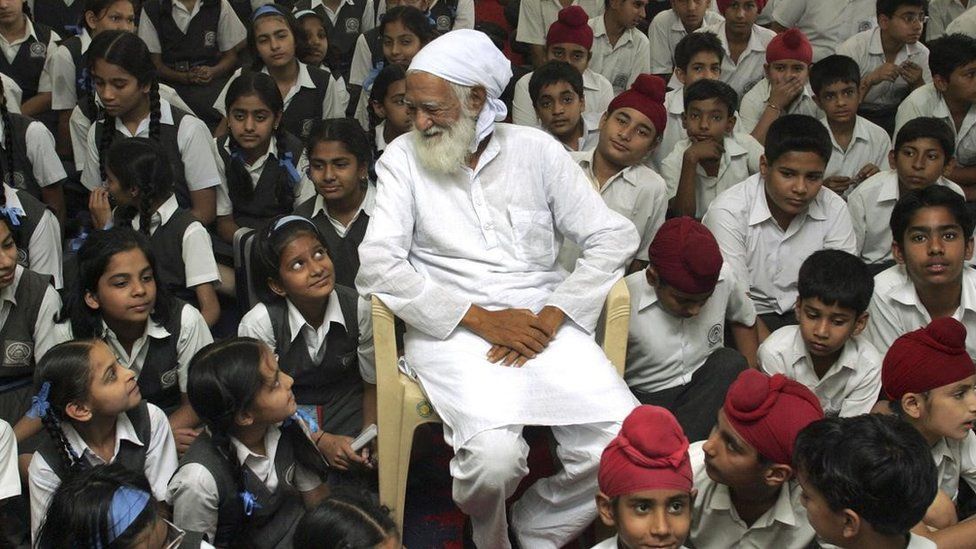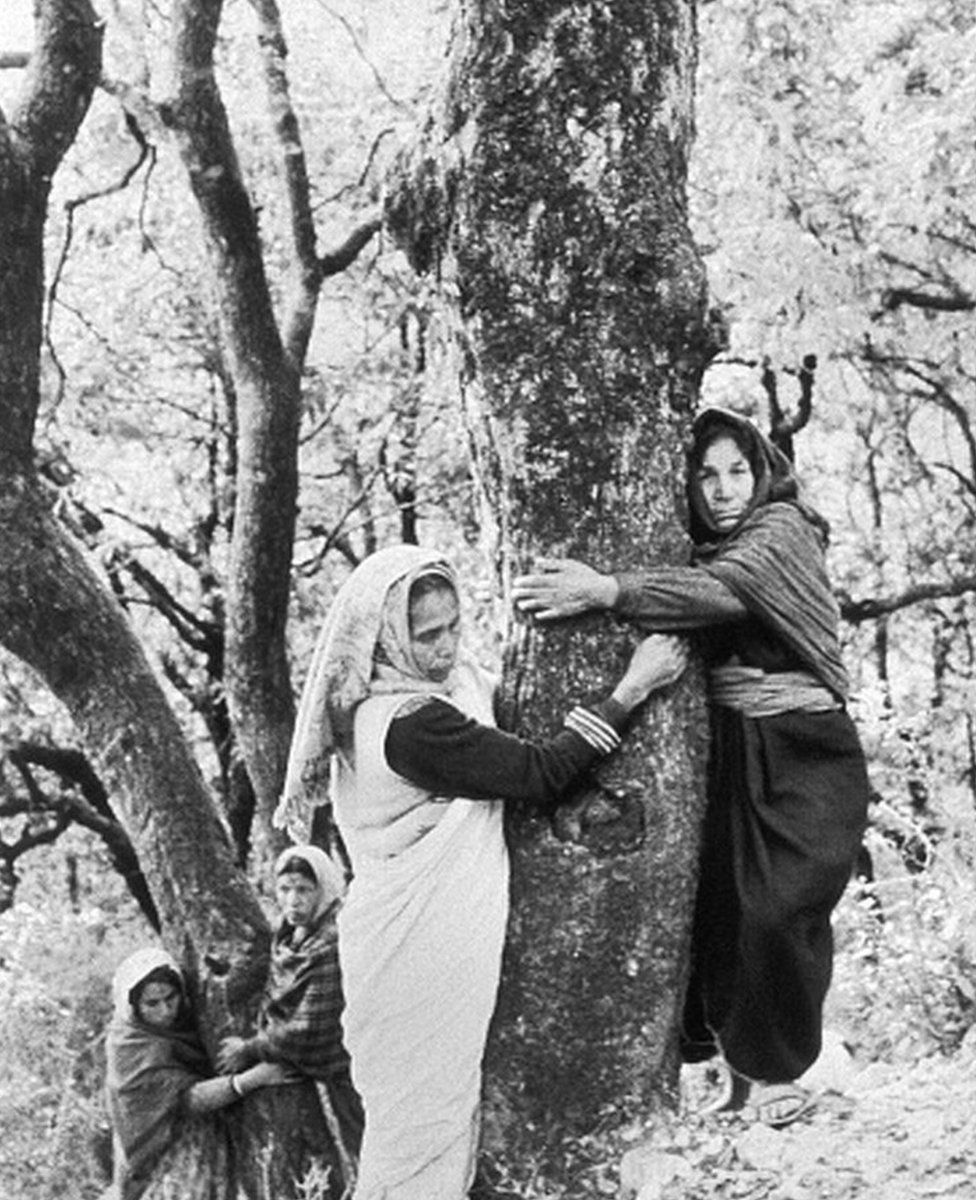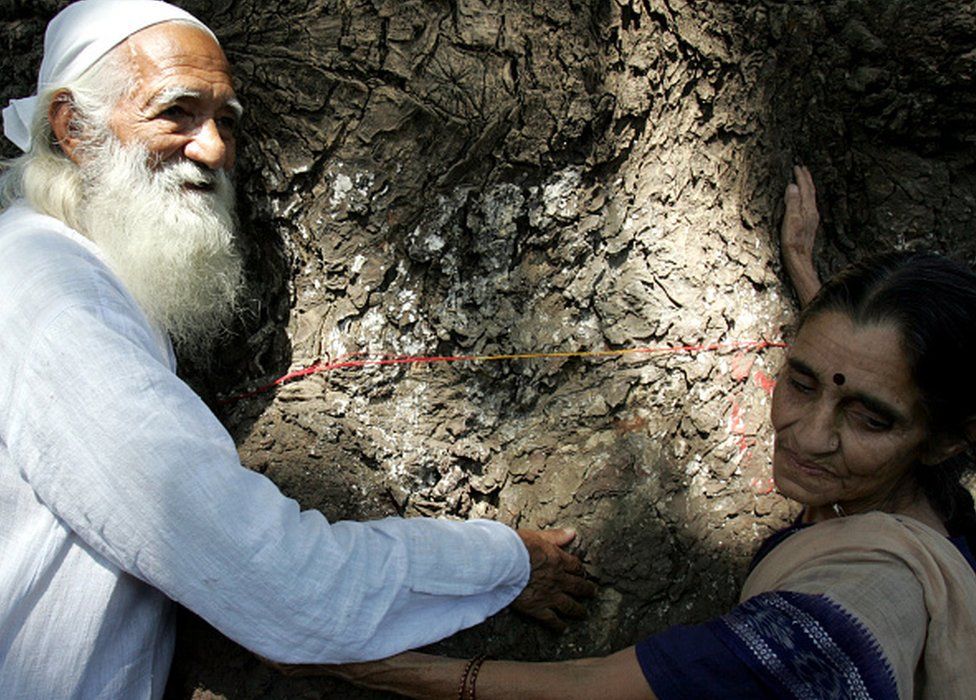Sunderlal Bahuguna: The man who taught India to hug trees

"We are doing violence towards the earth, towards nature. We have become butchers of nature," Sunderlal Bahuguna once told an interviewer.
Bahuguna, who died with Covid-19 on Thursday aged 94, was known the world over as the man who taught Indians to hug trees to protect the environment. He was one of the main leaders of the Chipko movement in northern India in the 1970s. In Hindi, chipko literally means "hugging".
Heeding calls by Bahuguna and fellow activist Chandi Prasad Bhatt, men and women in the Indian Himalayas embraced and chained themselves to trees to stop loggers from cutting them down. It was a powerful symbol that conveyed, 'Our bodies before our trees'.
It also became a movement that brought to the world's attention the devastation wrought by the environmental crisis in the world's highest mountains.
A devastating flood in Uttarakhand in 1970 had come as a rude awakening for villagers. They woke up to the "tenuous links between deforestation, landslides and floods", noted Ramachandra Guha, a historian who has chronicled the Chipko movement.
Three years later, Bahuguna and fellow activists began embracing trees. Young men took an oath in blood to protect nature.
Very soon, women in the Himalayas became an integral part of the movement too, embracing trees and tying rakhis - a symbolic red thread tied around a brother's wrist during the Hindu festival of Raksha Bandhan - onto the bark of trees. They walked in the snow and took away tools from loggers to stop felling.
Bahuguna, who grew up in the Himalayas, connected the dots well. He wrote that deforestation led to erosion of fertile land and pushed the men out of the villages to look for jobs in cities.
This left women to "bear all the responsibilities of collecting fodder, firewood and water, apart from farming". Not surprisingly, the Chipko movement became an important milestone in the fight to secure women's rights.
Over the years, Bahuguna, with his flowing beard and trademark bandana, went from strength to strength. College students and women joined him in greater numbers. They staged peaceful demonstrations, hugged trees and went on fasts.
It yielded results: a fast in 1981 led to a 15-year ban on commercial felling of trees in Uttarakahand. Two years later, he marched 4,000km (2,500 miles) in the Himalayas to draw attention to environmental degradation.
In 1992 he shaved his head and went on a fast to protest at the Tehri dam, India's tallest. He was among those who lost their ancestral homes due to its construction.
The indefatigable campaigner never stop lecturing, railing against the collusion of forest officials and private contractors in decimating forests.
When former prime minister Indira Gandhi was asked about Bahuguna's movement, she said: "Well, frankly, I don't know all the aims of the movement. But if it is that trees should not be cut, I'm all for it."
Despite the changing times, the symbolism of Bahuguna's movement lives on. In 2017, activists in Mumbai hugged trees to protect more than 3,000 of them from being axed to make way for a metro railway facility.
Bahuguna was a charismatic ascetic, a spartan man of Gandhian principles. He lived in a small ashram, denounced violence and was essentially non-political. He believed in self-reliance and not in "so much foreign trade". He despised materialism.
To become energy secure in a "non-violent and permanent society", he said, India needed to produce biogas from human waste, harvest solar and wind energy and hydro power from the run of the river. Improve machines so they consume less energy, he suggested.
Born in 1927 in Tehri district in what is now Uttarakhand, Bahuguna grew up surrounded by sal, oak and fir trees and sweeping pasture lands.
Amit Baruah, a former BBC colleague, remembers a school trip as teenage student in the late 1970s to meet Bahuguna in the Himalayas and see his work.
What he found was not someone seeking conflict or controversy, but an easy-going, gentle and soft-spoken man, who had made the "early link between cutting of trees and drying up of the springs in the Himalayas".
During his travels in the region, Baruah found the mountain springs were drying up and people walking long distances to fetch water. He says he understood that the campaigner's activism came from his own lived experience.
Sunderlal Bahuguna will be remembered as a man of the earth, who strove all his life to save it.












Comments